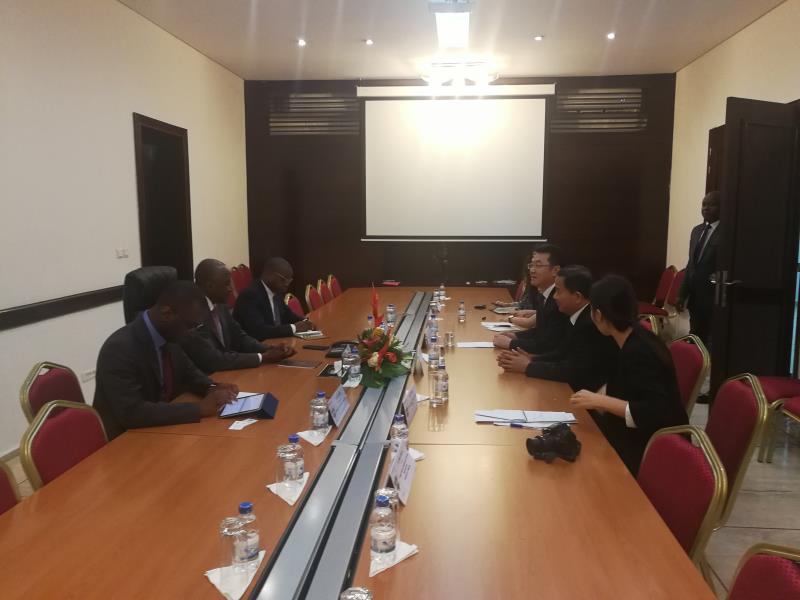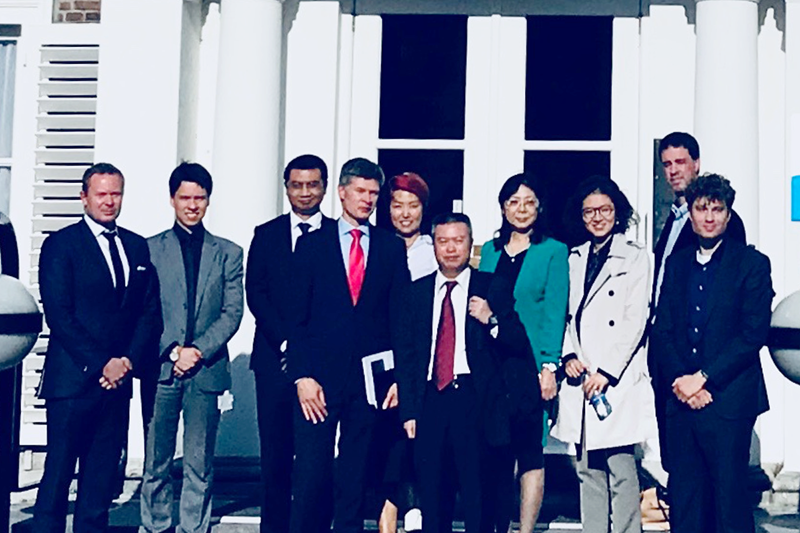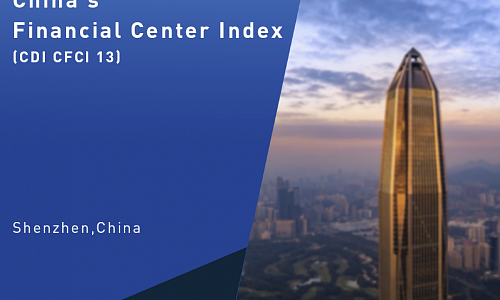
2018 - News

Mr. Zeng Zhen, Director of Urbanization Research Department, introduced development mode and industrial priorities of Shekou area, Luohu District, Futian CBD area, OCT area and Nanshan high-tech area. The delegation from MOTIE introduced seven free economic zones in Korea. Both sides shared development mode of special economic zones (SEZs) in China and South Korea.
 From November 19 to 25, Dr. Qu Jian, Vice President of CDI, and Dr. Liu Rongxin, General Director of the Department of Regional Development Planning at CDI, gave training to officials at Mariel Special Economic Zone (SEZ) in Cuba. The training program included SEZ-related development course, laws and regulations, regional planning, investment and financing, and operation management. Mariel SEZ, the first one in Cuba, was launched in 2013. Although it was well positioned as a critical hub in the Caribbean region, it was faced with difficulties of investment attraction and operation management.
From November 19 to 25, Dr. Qu Jian, Vice President of CDI, and Dr. Liu Rongxin, General Director of the Department of Regional Development Planning at CDI, gave training to officials at Mariel Special Economic Zone (SEZ) in Cuba. The training program included SEZ-related development course, laws and regulations, regional planning, investment and financing, and operation management. Mariel SEZ, the first one in Cuba, was launched in 2013. Although it was well positioned as a critical hub in the Caribbean region, it was faced with difficulties of investment attraction and operation management.

On December 5, US congressmen assistant delegation visited CDI and discussed the status quo of Shenzhen's innovation development with CDI experts.
CDI experts shared the views that Shenzhen has promoted its innovation-oriented and green economy with adopting the market-driven approach. What's more, Shenzhen also adheres to the Going-out Strategy and plays a vital role in strengthening cooperations with countries along the BRI in areas of infrastructure construction, traditional industrial upgrading which facilitates the industrialization development.
At last, both sides reached consensus that people-to-people exchanges will reduce the misunderstanding and contribute to the future cooperation.

In New Dehli, CDI and Confederation of Indian Industry (CII) co-organized a roundtable discussion on strengthening China-India cooperation in the healthcare sector on November 19. The participants ranging from policy makers, entrepreneurs to experts from China and India agreed that there is great potential for bilateral trade and investment in the healthcare sector and discussed how to facilitate the cooperation in the pharmaceuticals from the perspective of policy coordination. During the meeting, CDI and CII also signed a MOU according to which the two parties will further their cooperation in the joint research and events. The CDI delegation also participated in the 15th National Pharmaceutical Conclave 2018 and the 2nd National Biotechnology Conclave 2018.
In addition, the CDI delegation paid a visit to Sonata and Infosys in Bangalore to learn about India’s information and technology industry on November 23.
https://en.cdi.org.cn/component/k2/itemlist/category/82-2018-news#sigProId86960e0156
 On November 9, Ms. Emma Mcwhinnie Hodder, Deputy Consul-General of Consulate General of New Zealand in Guangzhou visited CDI. Dr. Hu Zhenyu, Director of Department of Sustainable Development and Blue Economy, greeted the delegation.The dialogue focused on CDI’s research on pacific island economic, as well as challenges and opportunities in terms of maritime economic cooperation.
On November 9, Ms. Emma Mcwhinnie Hodder, Deputy Consul-General of Consulate General of New Zealand in Guangzhou visited CDI. Dr. Hu Zhenyu, Director of Department of Sustainable Development and Blue Economy, greeted the delegation.The dialogue focused on CDI’s research on pacific island economic, as well as challenges and opportunities in terms of maritime economic cooperation.
 On November 5, a delegation of DPRK Economic and Technological Cooperation Association visited CDI and discussed the development of Shenzhen Special Economic Zone and the SEZ planning with CDI experts. In the meeting, the delegation noted that the SEZ mode is a good choice as the investment environment of DPRK has been improved.
On November 5, a delegation of DPRK Economic and Technological Cooperation Association visited CDI and discussed the development of Shenzhen Special Economic Zone and the SEZ planning with CDI experts. In the meeting, the delegation noted that the SEZ mode is a good choice as the investment environment of DPRK has been improved.
 From October 15-16, 2018, the New Silk Roads World Forum with the theme of “Forging A New Era of Connectivity” was held at Monash University in Australia, where CDI experts discussed the Belt and Road Initiative (BRI)with experts from different countries.
From October 15-16, 2018, the New Silk Roads World Forum with the theme of “Forging A New Era of Connectivity” was held at Monash University in Australia, where CDI experts discussed the Belt and Road Initiative (BRI)with experts from different countries.
Experts present shared the view that the BRI has played a positive role in improving the infrastructure connectivity and promoting the economic development along the involving countries. During the meeting, CDI experts also expressed some ideas on the financing mechanism, multilateral cooperation and potential risks of the BRI. All experts reached the consensus that properly addressing the above issues will contribute to the sustainable development of the BRI.
In Amsterdam, Rotterdam, Hague, and Copenhagen from September 16 to 23, CDI had meetings with experts from The Clingendael Institute, The Hague Centre for Strategic Studies, International New Town Institute, Euronext, and Danish Institute for International Studies on which both sides discussed the Belt and Road Initiative (BRI), the Guangdong-Hong Kong-Macau Greater Bay Area, Chinese financial innovation.
In meetings with The Clingendael Institute and The Hague Centre for Strategic Studies respectively, CDI experts discussed debt, investment and risk management of BRI with their European counterparts. CDI experts shed some light on the Guangdong-Hong Kong-Macau Greater Bay Area in their discussion with experts from Danish Institute for International Studies. What’s more, CDI visited International New Town Institute and held a roundtable discussion on urbanization andmetropolis management. CDI and Euronext also discussed how to facilitate capital connectivity between China and Europe.
https://en.cdi.org.cn/component/k2/itemlist/category/82-2018-news#sigProIdbcf2531d7d
 On November 1, European and American Investment Finance Group visited our institute. Mr. Zhou Shunbo, executive director of New Economy Institute had a roundtable discussion with the group on the issues of the status quo and prospects of Shenzhen's new economy industry development. During the discussion, Zhou Shunbo gave a detailed introduction to the role of the new economy industry in promoting Shenzhen's economic development and emphasized on the key force of digital economy in driving the social development and technology change.
On November 1, European and American Investment Finance Group visited our institute. Mr. Zhou Shunbo, executive director of New Economy Institute had a roundtable discussion with the group on the issues of the status quo and prospects of Shenzhen's new economy industry development. During the discussion, Zhou Shunbo gave a detailed introduction to the role of the new economy industry in promoting Shenzhen's economic development and emphasized on the key force of digital economy in driving the social development and technology change.

On October 10, CDI delegation visited Shanghai Representative Office of Confederation of Indian Industry (CII) and discussed way forward for China-India collaboration in key areas such as pharmaceuticals and health care sector with Mr. Madhav Sharma, Head, Greater China & Chief Representative, CII.
Mr. Madhav Sharma pointed out that Indian pharmaceutical companies have access to Chinese market; however, the major obstacle is information gap. It is difficult for Indian enterprises to understand Chinese market because policy updates in English are unavailable. He suggested that CII and CDI do joint research to bridge the information gap.
More...

Governor Marcelo Peterson briefed strategic plans for the FSM aquaculture, agriculture and tourism sectors. Aquaculture and agriculture have been highlighted by the FSM government as potential economic avenues that could meet the local demands for food and bring economic benefits including job creation and increased exports. Eco tourism, another area of potential for the FSM, has been targeted at high-end customers and emphasized environmental protection.
What’s more, the FSM is also faced with energy crisis as it heavily relies on imported fuel. With this regard, Prof. Fan Gang suggested that the FSM could consider comprehensive use of multiple renewable energy resources ranging from wind, solar to water so as to have access to affordable and reliable energy, which is vital for driving economic growth.
 On September 26, Chinese Ambassador to the Federated States of Micronesia (FSM) met with Prof. Fan Gang, President of CDI, and they had a discussion on the China-FSM economic cooperation.
On September 26, Chinese Ambassador to the Federated States of Micronesia (FSM) met with Prof. Fan Gang, President of CDI, and they had a discussion on the China-FSM economic cooperation.
Ambassador Huang Zheng briefed on economic and social developments in the FSM and pointed out that there is a great opportunity for the China-FSM cooperation in the fields of agriculture and tourism as the two sectors have been identified as the priority areas for economic development of the FSM.
Given that the FSM government has a clear vision and favorable policies for economic development, Chinese experienced private businesses should get involved in the China-FSM economic cooperation if their business models were profitable and sustainable in the FSM,” prof. Fan Gang said.
 August 3, 2018, accompanied by Chinese ambassador to Cote d 'Ivoire, Tang Weibin, CDI delegation met with Prime Minister of Cote d 'Ivoire, Amadou Gon Coulibary, in Abidjan, to exchange views on the planning and construction of industrial parks in Cote d 'Ivoire.
August 3, 2018, accompanied by Chinese ambassador to Cote d 'Ivoire, Tang Weibin, CDI delegation met with Prime Minister of Cote d 'Ivoire, Amadou Gon Coulibary, in Abidjan, to exchange views on the planning and construction of industrial parks in Cote d 'Ivoire.
CDI delegates introduced their feasibility research on industrial parks in Cote d 'Ivoire, and shared insights in terms of preferential policies, industry selection system, space layout, development mode and economic measurement.
Ivorian government attached great importance to the construction of industrial parks and agreed to develop agricultural processing, agricultural machinery and electronic products assembly supported by industrial parks, said PM Coulibary. Chinese enterprises and investments were extremely welcomed into the industrial parks in order to invigorate cotton-textile processing and other industries, as well as further boost local economic and social development.
Amb. Tang Weibin briefly introduced preparation progress of Beijing Summit of the Forum on China-Africa Cooperation. And he thought that PM Coulibary’s visit to China would further advance bilateral relations between China and Cote d 'Ivoire.
 Thanks to the successful experience of introducing new energy vehicles to public transport, the Gyeonygi Research Institute delegate paid CDI a visit and had discussion on the development of new energy application in China. CDI delegate believed, to forge the sustainable development of electrifying transportation, government ought to improve relevant technic to upgrade the quality of vehicles including batteries, electric machinery and etc. to meet the current needs. In the meanwhile, the maintenance efforts will also need the reinforcement and supervision.
Thanks to the successful experience of introducing new energy vehicles to public transport, the Gyeonygi Research Institute delegate paid CDI a visit and had discussion on the development of new energy application in China. CDI delegate believed, to forge the sustainable development of electrifying transportation, government ought to improve relevant technic to upgrade the quality of vehicles including batteries, electric machinery and etc. to meet the current needs. In the meanwhile, the maintenance efforts will also need the reinforcement and supervision.












